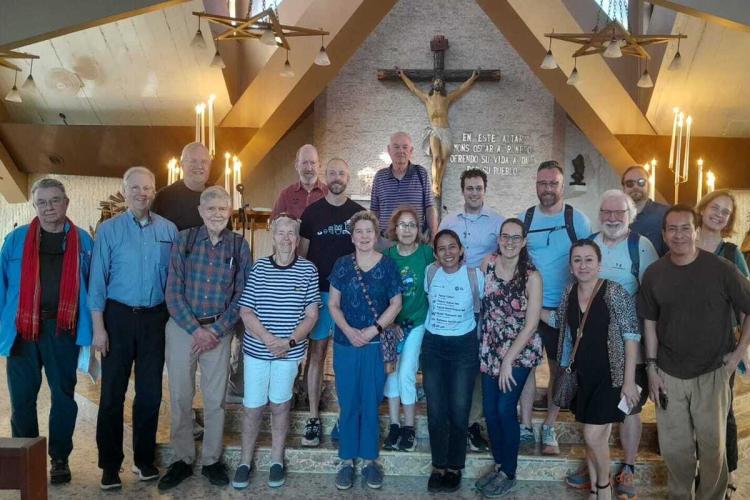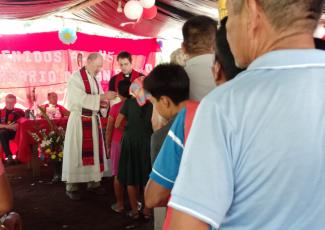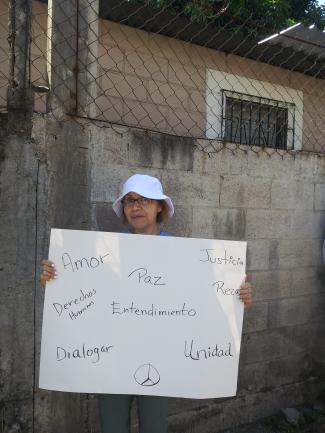During the 45th anniversary week of Óscar Romero’s March 24 martyrdom, the Episcopal-affiliated independent nonprofit Cristosal hosted an ecumenical group on a four-day pilgrimage in El Salvador to commemorate his life and teachings.
The Rev. Max Sklar, who is serving a diocesan-supported curacy at two parishes, Trinity Church in Haverhill and St. Anne's Church in Lowell, and Vivian Ruiz, also of St. Anne's Church, were among the 14 people taking part in the March 21-24 pilgrimage.
Their reflections follow below.
Cristosal is a 2025 recipient of a $25,000 Diocese of Massachusetts Sustainable Development Grant. Founded in 2000, Cristosal, from its base in San Salvador, assists internally displaced people and provides legal and accompaniment services to individuals and families whose human rights have been violated. It also has operations in Guatemala and Honduras. The organization's humanitarian assistance program was curtailed in February, and most of its staff cut, when the Trump administration put a freeze on some $60 billion in foreign aid. Cristosal is continuing its humanitarian assistance work through philanthropic support and individual donations. Churches in the Diocese of Massachusetts that have supported Cristosal include the Church of the Good Shepherd in Acton, Christ Church in Cambridge, St. Andrew's Church in Edgartown, St. Paul's Church in Natick and St. Paul's Church in Newburyport.
I joined the pilgrimage this March to El Salvador with Cristosal to commemorate the 45th anniversary of the martyrdom of Saint Óscar Romero. Martyrdom is the appropriate word to use here, for this pilgrimage above all has given me a deeper understanding of what martyrdom means. In Greek the word martyr originally meant “witness.” In a Christian context, this became quickly adapted to emphasize not primarily the death of a martyr itself, but on how that death is a witness to the resurrection, and the vindicating and liberating justice of God in Christ. In El Salvador we met countless people keeping the legacy of Romero alive, including living witnesses to Romero’s life and times, some of whom had met him. It was profound to hear them share their experience of living through the civil war--stories of displacement, imprisonment and disappearances, but also stories of communities resisting unspeakable evil with protest, prayer, song and mutual aid.
We witnessed how Romero’s legacy is lived today. There was not a service we went to, or a festival or vigil we marched during those packed four days of pilgrimage, in which both clergy and laity, Anglican, Catholic and others, did not witness fearlessly against the injustices going on in El Salvador today. The culmination of our pilgrimage was our participation in a mass in the Hospitalito church at the altar where Romero was martyred by an assassin’s bullet. After the mass we joined the overflowing crowd at the church going from there straight to a march against the Salvadoran government’s legalization of mining in which the marchers delivered a petition to El Salvador’s supreme court. But like Romero’s Gospel witness, the march was all encompassing in demanding justice, for the marginalized and for creation, and voicing a strong witness against the “state of exception” that for three years has allowed arbitrary arrests without due process.
Fellow pilgrim Vivian Ruiz described her experience of the march, in a reflection for the parish of St. Anne's Church in Lowell: "We started at [Romero's] church, then we visited his house; after that we all marched approximately three miles to see his tomb. While I was marching, I met a woman called Luisa from Santa Ana. She was very excited that we were there and that we shared this big day with them. She was curious about a few things: why I was there, where I was from and to what church I belonged. At the end of our conversation, she thanked me for marching with her. I learned how loving and caring people can be even when they have so little. It was incredible to see how thankful people were for the smallest things. That night we had our last supper together as pilgrims. We hugged each other to say goodbye. It was an emotional moment. A pilgrim is a stranger in a strange land; but our compassion, gratitude, care, self-love, grace, obedience…may those things be wherever pilgrims are."
Processing all we saw and heard on this pilgrimage, I am in awe of the resilience and dedication of the Salvadoran people we met for whom spirituality and action are intertwined and inextricable. We witnessed tireless dedication from the staff at Cristosal who investigate disappearances and displacement both from criminal extortion of gangs and abuses of the state, demanding justice and providing psychological and spiritual support and accompaniment for the victims. We witnessed this dedication also in the members of the base communities we visited, both Catholic and Anglican, who refuse to detach their spirituality from their social reality, and whose dedication to the Gospel leads them to sustain social initiatives for the well-being of their communities promoting gender equality, arts and literacy, and brings them to pray, to dance and to protest in equal measure. And all these practices are done in a political climate of repression where there is a real risk, a cost to discipleship. Saint Romero paid the ultimate price for his discipleship, but far from frightening and dividing the people, time and again we were told by our Salvadoran friends that their strength came from his example, his intercession and his continued presence among them. I would add that it is so with all the saints and martyrs whose lives point us to the way of Christ.
We, the pilgrims, were witnesses to all this. In that sense, we too were living martyrs in a small way. We returned home with hope, inspired by Romero as an example for our times of speaking the truth no matter the consequences, and an example of leadership that does not impose answers, but rather empowers communities to analyze, speak and live out the truth. Óscar Romero was a true pastor of his people, not a personality. In times like these in our own country, more than ever we need such communities and pastors.
--The Rev. Max Sklar, with Vivian Ruiz



